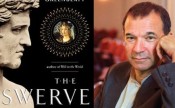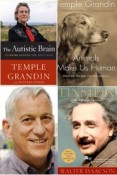Free Forum Q&A – TEMPLE GRANDIN, one of the most accomplished adults with autism, designer of livestock handling facilities, author, ANIMALS MAKE US HUMAN & (2) WALTER ISAACSON, head of the Aspen Institute, author, EINSTEIN: HIS LIFE AND UNIVERSE
Written on April 9th, 2015
TEMPLE GRANDIN – Originally aired January 2010
WALTER ISAACSON – Originally aired May 2007
Two extraordinary minds: Interviews about a couple of individuals who, though slow learners as children, grew up to do amazing things.
In the first half, I’ll talk with Temple Grandin, PhD, probably the most accomplished adult with autism in the world. Now a Professor of Animal Science at Colorado State University and a designer of livestock handling facilities, Grandin, who didn’t speak until she was three and a half years old, has become a prominent author, speaker and advocate on the issues of Autism and Asperger’s Syndrome. The 2010 HBO film based on her life won seven Emmys, including Outstanding Movie Made for Television, Outstanding Directing – Mick Jackson, and Outstanding Actress – Clare Danes.
In the second half, my guest will be WALTER ISAACSON, former managing editor of TIME magazine and Chairman of CNN, current head of the Aspen Institute, and the author of several bestselling books, including his biography of Steve Jobs. We’ll talk about his biography, EINSTEIN: His Life and Universe.
Einstein discovered, merely by thinking about it, that the universe was not as it seemed. His contributions changed the way we conceive of reality. A new biography makes the point that his scientific imagination sprang from his rebellious questioning of authority – a testament to the connection between creativity and freedom. In addition to his scientific genius, he was also noted for his social conscience Besides campaigning for a ban on nuclear weaponry, he denounced McCarthyism and pleaded for an end to bigotry and racism.
http://www.aspeninstitute.org/about/about-walter-isaacson
Q&A: STEPHEN GREENBLATT, National Book Award Winner, THE SWERVE: How the World Became Modern
Written on January 21st, 2012 |
Aired 01/15/12
In the winter of 1417, a short, genial, cannily alert man in his late thirties plucked a very old manuscript off a library shelf, saw with excitement what he had discovered, and ordered that it be copied. The man was Poggio Braccionlini, the greatest book hunter of the Renaissance. His discovery was the last surviving manuscript of an ancient Roman philosophical epic, On the Nature of Things by Lucretius—a beautiful poem of the most dangerous ideas: that the universe functioned without the aid of gods, that religious fear was damaging to human life, and that matter was made up of very small particles in eternal motion, colliding and swerving in new directions.
The copying and translation of this ancient book fueled the Renaissance, inspiring artists such as Botticelli and thinkers such as Giordano Bruno; shaped the thought of Galileo and Freud, Darwin and Einstein; and had a revolutionary influence on writers such as Montaigne and Shakespeare and even Thomas Jefferson.
Stephen Greenblatt is John Cogan University Professor of the Humanities at Harvard University. Among his books are Will of the World: How Shakespeare Became Shakespeare, a Finalist for the 2004 National Book Award in Nonfiction and a New York Times best seller, and Hamlet in Purgatory. He holds honorary degrees from Queen Mary College of the University of London and the University of Bucharest.

